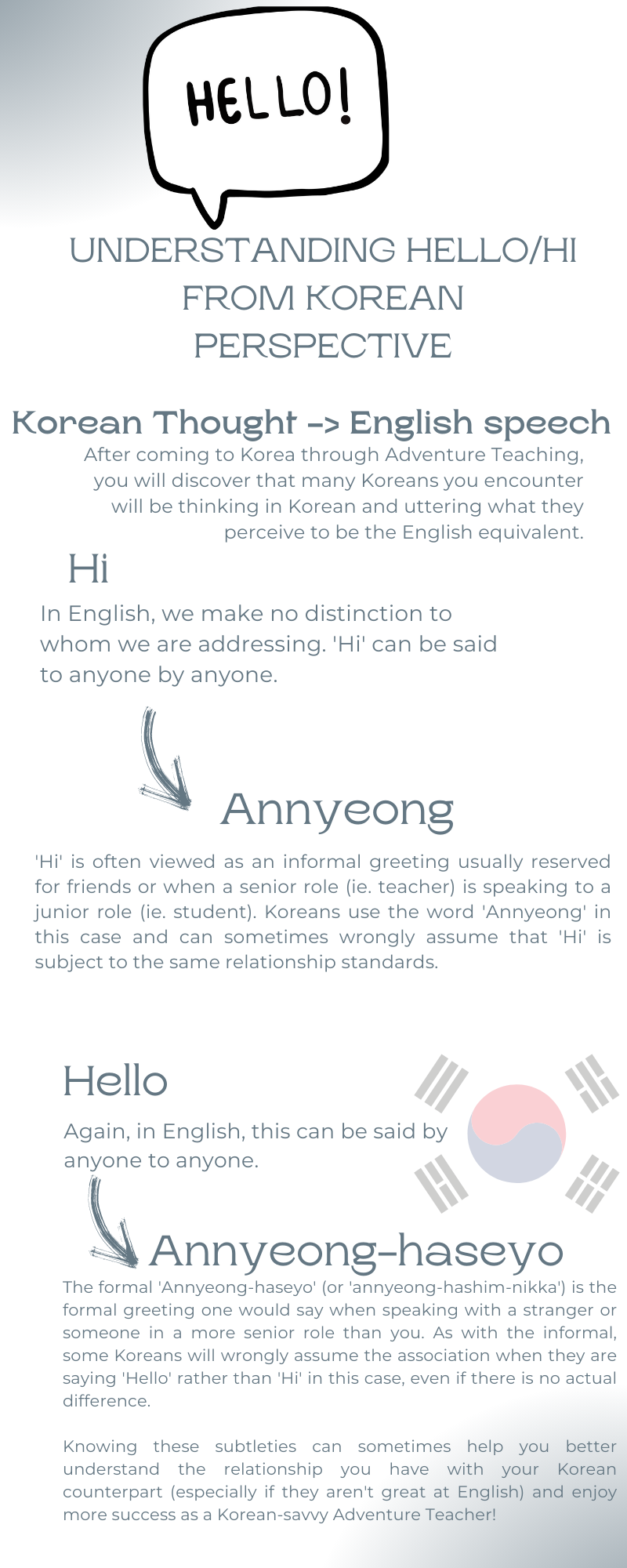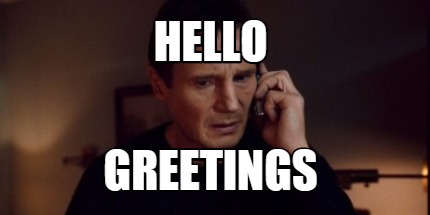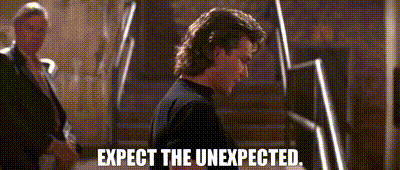Common English Mistakes in Korea – Hi/Hello
When teaching English in Korea, you can often come across common English mistakes in Korea ranging from the bonafide wacky stuff like someone saying ‘I’m so hard’ in the wrong context to even the slight and subtle ones such as simple greetings.
Wait, how can someone screw up saying ‘Hi’?
Well, it is not a screw-up per se, but there is the Korean mindset and usage behind it. As most Koreans think in Korean as they are speaking English, you should not just listen to what they are saying but also what they appear to be thinking.
just listen to what they are saying but also what they appear to be thinking.
Korean language uses honorifics in their words and sentences that vary depending on the relationship the speaker has with the listener. For instance, a grandchild would not say the Korean word for ‘Hello’ in the same way as the grandparent would say it back to the grandchild. Same with the student and teacher relationship. Even if the teacher is younger than the student. Role matters more than age. Case in point, my Korean brother-in-law is younger than me but as soon as he married my sister-in-law (who is older than me), I had to modify my communication to where I had to speak honorifically to him from that point on. Because his role changed to where he was in the more senior role due to his marriage to my sister-in-law. Confusing, right? Don’t worry, we can get your head around honorifics in a different article.
Common English Mistakes in Korea. Crossing the big divide between ‘Hi’ and ‘Hello’
Point being, in the vast majority of cases, any time a kid sees you and greets you with a ‘Hi’, it’s no big deal. But there are some parents who are sticklers when it comes to honorifics to the point where they sometimes transliterate the honorific into what they assume to be the English equivalent despite English not really having honorifics aside from tone or in a few cases like ‘Can I go to the bathroom’ vs ‘May I go to the bathroom, please?’ These parents can sometimes lecture kids into extending Korean honorifics over to English equivalents.
For example, ‘Hi’ in Korean is normally associated with ‘Annyeong’ (안녕), a greeting almost exclusively used between kids, close adult friends, an adult addressing a child or when a teacher is addressing a student (particularly kids), etc. Whereas, the more honorific ‘Annyeong-haseyo’ (안녕하세요) is sometimes associated with ‘Hello’, and thus may inadvertently carry the cultural implications over to the English greeting.
Although maybe not a glaringly common English mistake in Korea, next time you hear a child saying ‘Hi’ to you vs another one saying ‘Hello’ to you, you shouldn’t be bothered by it too much but instead, be mindful that in the Korean mindset, they have stepped out of the teacher-student relationship and could therefore be somewhat disrespectful. But it could be one overlooked clue in diagnosing if the student is actually disrespectful in general so you can modify your teaching approach with him/her. On the other hand, if a student consistently opts to greet you with a ‘hello’ and the Korean bow when they enter or leave the classroom, you could read more into that where the parents may likely be overextending Korean honorifics into English and English situations, which could complicate their learning and understanding of the language and situations. Being polite is fine, but as Korea has a labyrinth of Confucian references in its language and culture, that should be avoided completely when learning a new language and the culture behind it. Otherwise, loads of miscommunication are bound to surface in a wide range of situations later in life when communicating in English.
So in those cases, you could take the initiative to inquire with the student as to why they prefer to interact with you in the way they do and if they are indeed appearing to wrap English in a Confucianist blanket, in which case, you might want to consult with a Korean co-teacher on how to adjust that perspective the student may have.
Have you ever received any odd questions from a Korean before that made you wonder what they may have been thinking in Korean before the English came out of their mouth? Let us know in the comments and we can help wrap your head around it!





